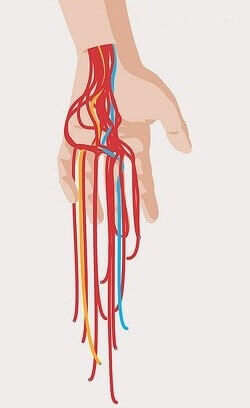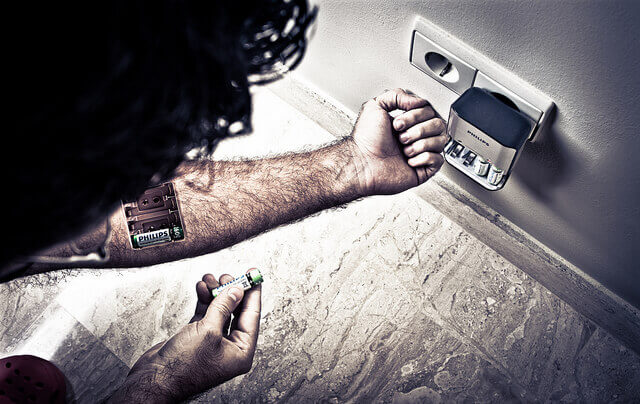Augmentation in the Bedroom: Biohacking and the Inevitability of Cyborg Sex
Rich Lee wants to give you a superhuman penis.
Have you ever wanted to upgrade your body? Make improvements to all those physical limitations? Build a better version of yourself?
How about augmenting your sex life?
Biohacking is a radical new scientific field that is as groundbreaking as it is notorious. Approaching the human body with what is described as a hacker ethic, it encompasses a wide variety of different practices, ranging from cybernetic augmentation to gene sequencing and biological manipulation.
Referring to themselves as Grinders, this community of fringe innovators aims to become the world’s first cyborgs, one implant at a time. They advocate an open-source upgrade culture, operating within a strange intersection of body modification, hardware fetishism, and home surgery.
And some of the advances they’re starting to make are truly incredible.
Basement enthusiasts are eagerly embracing the trend of magnetic implants. Eventually, we could all be seeing with expanded sensory devices, or streaming first-person POV footage straight to our computers.
We might even be having cyborg sex.
Introducing the Lovetron9000

Rich Lee is a biohacker who first received attention from the press in 2013 when he surgically implanted neodymium magnets into his ears. With an eventual goal to compensate for his failing eyesight, he intends to connect his implant to an ultrasonic rangefinder. Producing hums to indicate distance from objects, Lee eventually wants to learn to use it to see via echolocation.
Like many Grinders, Lee was drawn to biohacking by a desire to overcome a disability. But while initially focused on restoring function, he’s since moved on to augmentation.
In fact, he promises the new implant he’s developing—the Lovetron9000— will profoundly alter the nature of sex.
Speaking to Future of Sex about his research, Lee outlined the benefits of cyborg sex, what the future of biohacking has in store for the bedroom, and how the Lovetron9000 is going to upgrade your penis.
Lee was inspired to develop the implant back in 2011, fueled by memories of classic science fiction. Initially describing it as sorcery with science at its core, he compared its mechanics to a tension or erection ring [NSFW].
Implanted within a layer of pubic fat, the Lovetron9000 makes use of a small motor to send vibrations throughout the penis. The battery is recharged through induction, requiring only a special wall charger that rests on your lap.
Featuring multiple pulse rhythms to cycle through, it will be invisible to the untrained eye. A textured version is also available, which Lee claimed will “look all freaky.” It will be textured with bumps and strategic ridges for your partner’s pleasure, he added.
Despite straddling the boundary of future shock, society has been gradually acclimatizing to this concept for years. The ubiquity of smartphones along with wearable technology like Google Glass has already begun erasing the line between device and person.
Postmodern academic Donna Haraway wrote about this as far back as 1985 in her now-famous “Cyborg Manifesto.” “By the late twentieth century,” she argued, “we are all chimeras, theorized and fabricated hybrids of machine and organism; in short we are cyborgs.”
While a smartphone might not be as daunting as a cybernetic penis implant, we’ve already integrated the technology into our lives so thoroughly that the distinction is largely negligible.
The Cost of Involvement
 Going under the scalpel might represent a drastic step for some, but Lee stressed that the procedure won’t be overly invasive.
Going under the scalpel might represent a drastic step for some, but Lee stressed that the procedure won’t be overly invasive.
Like many biohacking implants, he intendeds for the installation to be performed by body modification artists, rather than surgeons.
“They know what to avoid, and what to watch out for. Something like this should be an easy procedure for them and probably take just a minute or two,” Lee said.
However, the Grinder life certainly isn’t an option for everyone, especially those with a weak stomach. Central to biohacking’s DIY punk ethos is an almost masochistic approach to the human body as a test bed for new technologies.
Typically, all but the most dangerously invasive implants are inserted without anesthetics. This is less a painful rite-of-passage ritual than it is about offering legal protection for practitioners.
Performing surgery without a medical license is a criminal offence. The absence of anesthesia allows biohacking to be technically classed as body modification rather than a medical procedure.
Keeping installation of a device within the purview of body modification experts serves another important purpose: making sure it stays cheap.
“Once surgeons get involved the cost of the procedure will be ridiculous, and then only rich people will have a Lovetron9000,” Lee said.
Ease of accessibility is essential, as Lee envisions a future where the implants are commonplace:
Having sex with a cyborg will be great. Imagine sex, but with deep, unnatural, and stimulating vibrations. It’s like a vibrator and a boyfriend! The question is: will you ever be able to go back to having sex with non-cyborgs? Nope, you will no longer be satisfied by humans. Game over humans!
While the Lovetron9000’s design is intended to increase your partner’s pleasure, the same vibrations will also provide personal gratification. But Lee warned, “There is a chance you might climax faster. I’m still trying to work out some bugs there, so that the vibrations might help you to last longer.”
Alien Horizons

Unfortunately, the extreme, bleeding-edge quality of the technology has held back its development. And the lagging progress is compounded by the lack of comparable market data. As a result, Lee has encountered significant difficulty in securing commercial funding for the device.
“Finding engineers for this kind of thing was hilarious. I’ve been turned down by quite a few firms. Trying to find investors is infuriating,” he said.
Lee also has plans to develop more sex-oriented biohacks, including one for women. Implanted in the labia, the device will make use of pressure produced by two electromagnets on either side of the clitoris.
“When activated it will gently squeeze and release the clitoris,” Lee said. “Slowly at first, but then so rapidly that it’s like a vibrator.”
He jokingly added, “I encourage people to stop me though before someone is hurt.”
Lee isn’t the only one who’s attempting to improve sex. A company called Sweet Peaches Probiotics has been courting controversy with its recent entry into the biohacking game. Its plan to release a supplement that’ll allow women to hack their genitals to smell like fruit has been met with equal parts fascination and outrage.
Lee confirmed there are other Grinders with similar projects in development. He made reference to “crazy biological things to make your semen flavored, or eliminate normal male recovery time between male orgasms.”
But will these new technologies have a positive impact on our sex lives? According to Lee, the future of biohacking could range from bleak to bright, depending on how we engage with it.
I can envision some people with spinal implants using sexual stimulation as a reward system for accomplishing daily tasks like taking out the garbage. I can also imagine jealous or controlling lovers setting their own passwords for your device to inflict some sort of chastity situation. Or maybe your church wants you to take a vow of joylessness and the settings are rigged to continually disrupt sexual pleasure signals. There are all kinds of alien horizons to explore.
Would you be interested in receiving a biohacking implant?
Image source: Rich Lee, Christopher Dombres, Andrés Nieto Porras
Leave a reply
You must be logged in to post a comment.

















